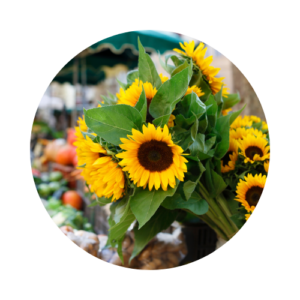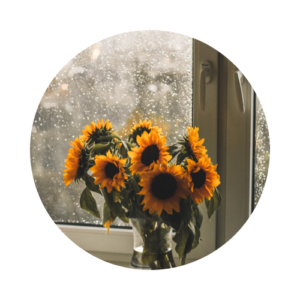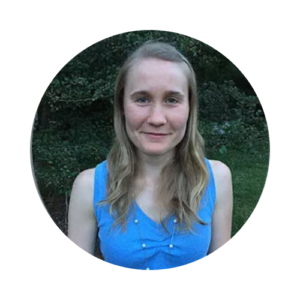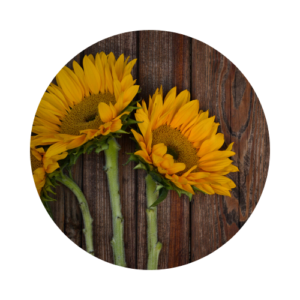Just inside the pasture, to the right of a wide swinging metal gate, Dad planted a large garden.
It included a wide variety of vegetables in neat rows, and we were impressed when he told us his family’s garden on the farm in Minnesota was much larger—a whole acre. We were by no means the primary caretakers of the garden, but even with the little we had contributed, we didn’t want to imagine the level of constant care that such a garden would require.
Missi and I were each allowed to select a packet of flowers to grow in our own little section of the garden, and we both chose sunflowers. We planted, watered, and weeded with eager expectation. It was the first time that I remember growing a plant on my own and the twin pleasures of independence and anticipation were intoxicating.
Soon thick green stems stood tall and large leaves unfurled in a mysterious, flower-like pattern of their own. Buds formed. We would see flowers any day now.
A few mornings later, my little brother Eric sallied in the kitchen door holding a pair of scissors and a bouquet of flowers. Sunflowers. “For Mom!” he beamed.
I was horrified. Livid. Incensed.
I accompanied him as he delivered his gift and laid my case before Mom.
He had watched us plant the seeds, seen us care for the growing plants, heard us excitedly discussing when they would finally bloom. He knew that this would be devastating. He wasn’t trying to be kind to Mom; he was trying to be mean to me. With impunity. And it was working!
I hadn’t even known that they had bloomed. Eric’s bedroom window faced the garden. He must have seen these, the very first blooms, when he woke and immediately struck out to massacre them.
I trailed off. I had been on the other side of this skirmish often enough, and I knew my cause was lost. Mom always assumed nothing but sweetness and light from the youngest combatant.
When we colored together, I frequently copied Missi’s drawings even though she despised me for it. If she complained to Mom, she always heard, “Imitation is the highest form of flattery,” and was advised to appreciate the compliment. Yet, we both knew better.
Yes, I often copied her because her drawing appeared masterful and far beyond my own ability and I hoped that, by copying her, mine would turn out even sort of like hers. But, there was also a large helping of passive aggression. I copied her because I knew she hated it and I knew I would get away with it.
I was now experiencing the flip side of this equation. Mom heaped praise on Eric, lauding his kindness and thoughtfulness. She told me that he meant no harm. He was so little, after all. He was just trying to be nice.
I looked at him. He looked at me. We both knew better.
But there was no recourse.
Of course, the sunflowers couldn’t be put right, but I wanted so badly to be consoled for my loss. To know that Mom recognized and acknowledged my pain—the hopes and dreams butchered by Eric’s kitchen scissors. I didn’t know how to articulate in my fury and sorrow that I didn’t really need him to be punished. I just needed to be understood.
But to Mom there was no nuance. She saw no possibility that he acted from dual motivations. She felt it unnecessary to chide him for decimating our sunflowers and equally unnecessary to comfort me. To her, I was not a victim; he was misunderstood.
Silent and seething, I gave up.
Like the heads of vanquished warriors, the sunflowers were displayed in Mom’s beautiful blue painted vase until they wilted.

Towards the end of the summer I was sixteen, I spent a month visiting relatives in Minnesota.
That spring I had undergone a risky but necessary surgery to remove a rapidly growing cyst at the base of my brain, and had spent the intervening months on swelling-reducing steroids with dreadful side effects ranging from hallucinations to my face puffing to cartoonish proportions. This while slowly re-growing my shaved hair and healing and remapping my nervous system after the damage inflicted during the procedure. Learning to walk again, to feed myself again, to write again.
Breaking that down meant learning how to lift my legs again. Learning how to grasp again, how to manipulate a utensil—a feat I couldn’t accomplish without encasing the handles in the large red foam tubes sent home from the hospital for that purpose. Learning how to grip a pen and painstakingly, agonizingly form letters that were angled and ugly and barely legible even to me.
Now, in July, frail and fragile, weighing eighty-five pounds, but once again able to walk and eat on my own, I was in Minnesota to forget.
The trip was designed to ease the separation from my best friend who had sent me an email the night before my surgery—the surgery with a 50/50 chance of survival and a greater than 50% chance of paralysis—saying he loved me. The email, printed for me by my sister but intercepted by my father, led to what would be nine months of no contact between us because, in the courtship culture our families subscribed to, saying he loved me crossed a line. We were giving our hearts away, stealing from our future spouses, committing idolatry with our emotions and with each other. We were no longer to see or speak to each other.
Losing my best friend at a time when I most needed support—when every day involved excruciating pain and therapy and every night was a desert of sleep or a deluge of nightmares, when I felt hideous and ridiculous and incompetent, when everyone was so busy celebrating that I had survived that they didn’t perceive my daily desperation, when my family went back to life as usual and I was expected but unable to do the same—sent me spiraling into a deep depression.
Now, with one thousand miles between us, I was intended to forget and ideally to move on.
I began by staying with my farm-raised grandparents and, more specifically, my home-economics-teacher grandmother. I adored them and they me, but those they loved, they fed. I remember sobbing in the bathroom before meals, knowing that I would be affectionately coaxed and prodded to eat more than I physically could handle given my suppressed appetite and necessarily minimal physical activity. Yet no was not an option. Although I enjoyed the rest of my time with them—the stories of their childhoods, the lakeside sunsets, the cribbage games—for the first time in my life I was relieved when the time came to move on.
My next stop was with my cousin Emily, only a few months younger than me. She and her family were warm and friendly and fun. They had converted their farmhouse attic into Emily’s bedroom and had recently painted the walls and ceiling a bright, sunny blue with fleecy clouds sponged on the ceiling and brilliant sunflowers clustered behind a picket fence on the walls. It was an idyllic scene created by a happy family.
Emily’s friends were kind and welcoming. They had prayed for me during my long journey to a diagnosis and the continuing recovery. They included me in activities I could participate in—helping in their church’s booth at the county fair and visiting a favorite local amusement park although I couldn’t ride the rides.
Emily’s boyfriend was jovial and friendly, although maybe not too perceptive. He found a strange quirk of my new nervous system hilarious, and unknowingly pushed my already stressed pain toleration limits. Since the surgery, sounds at a certain pitch instantly caused my right foot to seize with agonizing cramps. In fact, I would feel the cramp beginning before I could hear the sound. A single clap or a car door slamming and a variety of other everyday sounds were within the range of triggers, and he found intense amusement in clapping near me. Nothing I said could convince him that it was not merely uncomfortable but truly excruciating. I began to dread being around him, but I never blamed him. I was confident that he truly didn’t, and for some reason couldn’t, understand.
I envied Emily the gentle ribbing her family gave her about her boyfriend, her freedom to laugh along with them and to be seen with him without fear. Without wondering if they had seemed too happy together, had spent too long together. I marveled at her openness with her parents, friends, and teachers. It was clear she was secure in her relationships with them, not foundering on an uncertain footing of shifting expectations. She was safe and she knew it.
One evening Emily’s mother, my aunt LeeAnn, took me to a movie she billed as a chick flick, a type of movie that Emily wasn’t into. The film, Legally Blonde, while clearly ridiculous on so many levels, also resonated deeply with me. I absolutely related to being perpetually underestimated and then limited by others’ vise-tight perceptions of me and my worth. To being carefully curated for a life I would not be leading and unprepared for any life I wanted to lead. Of course, I was not intended to be a Beverly Hills society girl, but a stay-at-home daughter and eventually, when deemed ready and once a suitable candidate won over my parents, a stay-at-home wife and mother whose role would be supporting my husband’s vision for his life.
I did eventually want to marry my best friend and have children together, but I also wanted study and scholarship, significance and self-worth. I wanted a world in which these were not viewed as mutually exclusive, a world in which I could be and be known as a whole person.
Under the sunflowers in the dusk of Emily’s room on those long summer evenings, I pondered and pined and mourned. Yes, for my best friend. But even more, for Emily’s relationship with her parents. I witnessed over and over again that she was known and loved for exactly who she was. They were not afraid of her or she of them. I wanted to know how that felt.

After a few weeks with Emily, I stayed with my aunt Karen. She was kind, thoughtful, considerate, and calm. She made time for deep conversations and space for long naps. I loved my time with her. On our last day together, I began a lifelong relationship with gazpacho at a favorite restaurant of hers in Minneapolis on our way to drop me off at my next destination, her daughter Meredith’s home in uptown.
Meandering through the bustling downtown farmer’s market on our way back to the car, we marveled at a florist’s stand overflowing with gorgeous sunflowers. She told me how much Meredith loved sunflowers and exuberantly relived once stopping with her to gather a generous bouquet from a median during a trip out west. This abundance, loving her daughter’s loves, celebrating her daughter’s joys, was astonishing to me. I couldn’t believe the relationship they had, the reckless adoration she expressed for her daughter.
Here my memory diverges. In one strand, she purchased a bouquet for Meredith and when she dropped me off, arranged the flowers in a vase in front of the window overlooking the street. In another, I only told Meredith later how I had enjoyed the story about them gathering sunflowers together.
In either case, I was stopped short as my cousin remarked in what struck me as an inscrutable tone something about her mom still thinking she loved sunflowers. Although she probably meant very little by it, I was struck by the realization that even the best relationships may not be all they appear, may have hidden faults or secret hurts or unsuspected misunderstandings.
The entire visit with my cousin, though enjoyable, felt off balance as I worked through the implications of this realization. I thought of how my mom frequently picked up Reece’s Pieces for me. They had been my favorite candy until I had discovered dark chocolate. Afterwards, they seemed a little too sweet, but I was always so thankful for her kindness and enthusiasm in giving me something that I loved—a profoundly meaningful gesture that fed a hunger running much deeper than chocolate cravings—that I had never told her I had moved on.
I wanted to cultivate gratefulness for the ways my parents could and did love me.

I did many new things with Meredith—attended a performance of the musical South Pacific while she served as usher, sampled gelato at a shop just around the corner from her house, carried on conversations like normal while her roommate and the roommate’s boyfriend spent a remarkable amount of time behind closed bathroom doors.
On my last day with her, Meredith asked if I wanted to join her for a bike ride. I loved to bike and enthusiastically agreed although I harbored some secret doubts. When not home in Minnesota, Meredith led bicycle tours throughout Europe. Would I be able to keep up? I hadn’t ridden a bike since well before my surgery. But the ride sounded refreshing and mind clearing, and it was a beautiful day. It was worth a try.
As I mounted the bike and prepared to round the corner from her driveway to the road, I learned that you can indeed forget how to ride a bike. Or at least your body can. My body, I discovered, no longer knew how to balance on a bicycle. I spent our brief ride careening, weaving wildly, then crashing, unable to ride more than short distances before wobbling out of control. Although Meredith was so kind, I felt embarrassed and humiliated. Blaming my surgery seemed like a cop out. After months of fighting my body over literally everything I wanted to do, it felt like I was the failure, not just my body.
What she had meant as a gift, a way to share an experience and build relationship, had instead left me feeling isolated and broken.
I thought again of the sunflowers—their beauty and optimism and openness. I remembered Eric’s stolen gift, Emily’s cheery wall, the farmers market stand. They all seemed to me to represent our best attempts at love—variously tentative, selfish, misguided, generous, thoughtful, whole-hearted, full-throated, unwanted, misunderstood.
Today I have married my best friend (yes, that best friend). We are raising our beautiful children together. I have studied and taught and grown. I am feeling my way through a new and much healthier relationship with my parents. I am becoming whole.
And today sunflowers remind me of the complexity of our needs and the barriers to expressing them and meeting them. Simultaneously, they are an assurance that love will not always be wobbly, overcorrecting, and exposing. They are a promise that love should and ultimately will restore the conquered, bind up the broken, and turn all faces from ourselves to the sun.

Rachel Brown
enjoys sipping tea, savoring good books, and spending time outside.
She is daily inspired to live more deeply and love more fully by her husband and two children.

3 Responses
I think this is one of my favorites so far.
Beautiful, Revealing of yourself the yearning many of us keep locked up, that of being heard and seen.
Thanks Rachel for sharing so deeply!